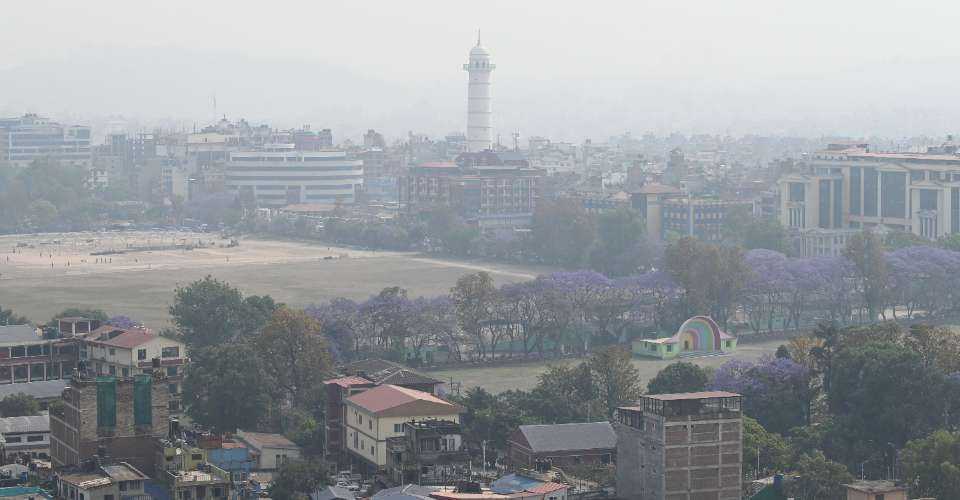
A general view shows high levels of air pollution amid dense smog in Nepal's capital city Kathmandu on April 29. (Photo: Prakash Mathema/AFP)
The authorities in the Nepali capital, Kathmandu, and other cities have issued a public health advisory, asking people to take precautionary measures as the Himalayan nation’s air pollution worsens.
The government has urged people to wear masks and avoid exposure to harmful outdoor air pollution in the coming days.
“Kathmandu continues to be among the most polluted cities on the global list for several weeks now, and it is a matter of serious concern for us," said Prakash Budhathoki, spokesperson at the Ministry of Health and Population, in a statement on April 29.
"We have witnessed a rise in the number of people visiting hospitals complaining of respiratory and cardiovascular problems,” he said.
Environmental data showed Kathmandu tops the global list of cities with high levels of air pollution, prompting the city authorities to urge people, especially vulnerable groups such as children, elderly, and pregnant women, to protect themselves.
According to IQAir, a Swiss air-quality monitoring group, Kathmandu’s air has reached unhealthy levels for several days since April this year. Sometimes, it tops the list of the most polluted cities, ahead of cities like Delhi and Chiang Mai in Thailand.
The group tracks air quality around the world and measures PM2.5 levels, a toxic inhalable pollutant.
On the morning of May 2, Kathmandu became the most polluted city as its Air Quality Index (AQI) reached 178, about 12.5 times higher than the permissible level set by the World Health Organization.
Generally, AQI 5-50 is considered safe and healthy. Kathmandu’s AQI hovered over 150 for several weeks. The city’s AQI reached a record high of 212 on May 1 morning.
Nepal was ranked the eighth most polluted country on the IQAir ranking in 2023. Bangladesh topped the list, followed by Pakistan and India.
Poor air quality has been an issue for Kathmandu for years, and experts say other factors have fueled it further.
Sudeep Thakuri, a climate scientist at Mid-West University in Nepal, says the widespread forest fires, agricultural burnings, and extended dry spells of winter have released harmful pollutants such as particulate matter, soot, smoke, and black carbon into the atmosphere.
He said industrial emissions traveling from India and China are also responsible for worsening the air quality in Kathmandu and other parts of the country.
At least 74 of Nepal's 77 districts have reported fire-related incidents so far. A forecast of no rains, at least for the next couple of days, is likely to deteriorate the air quality situation in the country.
Nepali residents have reported various ailments due to exposure to toxic air.
Kathmandu resident Rina Shrestha, 36, has been suffering from a prolonged cough and visited the hospital twice.
Shrestha, a rider for inDrive, a ride-sharing service provider, says she has problems breathing and feels lethargic whenever she returns home after work.
“You feel the pungent smell of the air once I go out and suffer from sore throat every time,” she told UCA News.
Suspended air pollutants such as soot, smoke, and black carbon have resulted in extended hazy conditions in Pokhara, Nepal's tourist capital.
Not only public health but livelihoods and tourism are also affected due to air pollution.
“This is the peak tourist season as mountain sightings and trekking are popular. The hazy weather has led to canceled flights for almost a week now and we have received dozens of cancellations from our guests,” said Sagar Bhusal, owner of Romantica Hotel in Pokhara.


